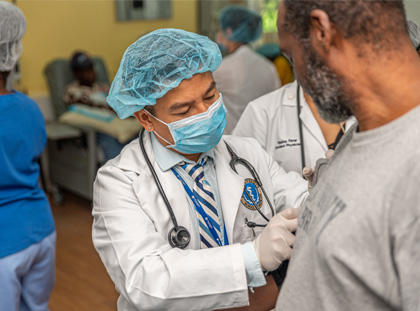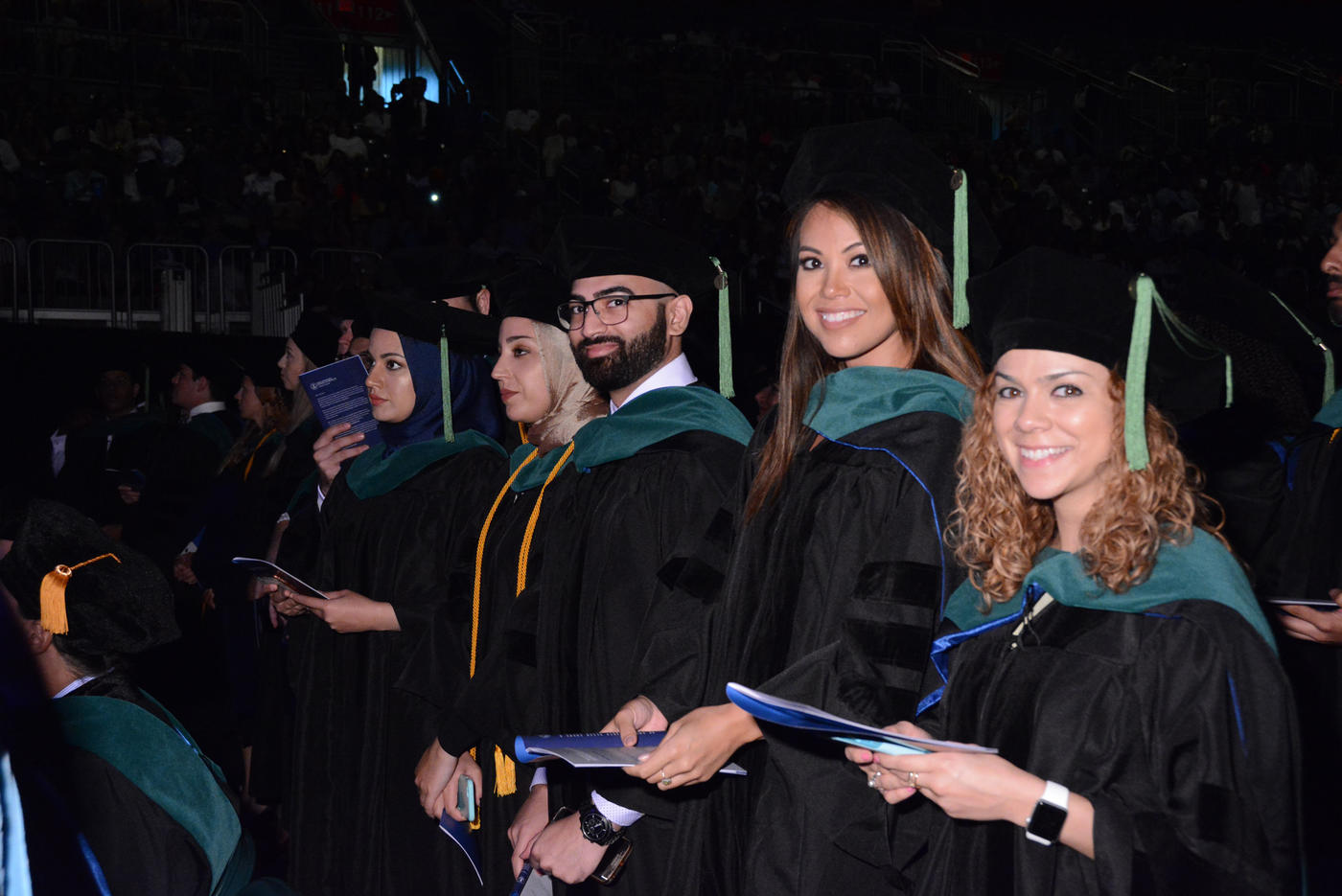Hospitals in the United States and Canada—as well as clinics, government agencies, group practices, medical offices, nursing homes, and universities—hire physicians based on their abilities and qualifications. When hospitals need an internist or other doctor, they hire the one they think best fits the role—not the one who went to a prestigious or famous medical school. In the United States, there is a doctor shortage—not a surplus—and qualified physicians are in demand no matter the source of their qualifications.
Graduates of accredited Caribbean medical schools—such as the Ross University School of Medicine (RUSM)*—have Doctor of Medicine (MD) degrees that enable graduates to practice in all 50 states—and that is what matters. It should be remembered, however, that MD 's must first complete a medical residency and attain licensure before they can practice medicine.
Caribbean Medical School Accreditation
As long as they are accredited, there are many Caribbean medical schools to choose from. When investigating a Caribbean medical school, prospective students should first learn if it is accredited—meaning the school meets the functional and structural standards for medical education in their particular region. Many wonder: Are Caribbean medical schools LCME accredited? This means that the med school’s accreditation meets the standards of the Liaison Committee on Medical Education (LCME), the accreditation authority for medical schools in the United States and Canada that provide MD degrees.
Students of accredited Caribbean medical schools, such as RUSM*, enjoy the same privileges as students of medical schools in the United States and Canada. RUSM students may qualify for federal student loans through the U.S. Department of Education. RUSM students may register with the Educational Commission for Foreign Medical Graduates® (ECFMG®) to begin the United States Medical Licensing Examination® (USMLE®) process. RUSM students may also move on to medical residencies accredited by the Accreditation Council for Graduate Medical Education (ACGME), the residency authority in the United States and Canada.
RUSM, located on the island of Barbados, is accredited by the Caribbean Accreditation Authority for Education in Medicine and other Health Professions (CAAM-HP). CAAM-HP is recognized by the U.S. National Committee on Foreign Medical Education and Accreditation (NCFMEA) as meeting LCME standards. CAAM-HP is also recognized by the World Federation for Medical Education (WFME), the international authority on medical school standards. CAAM-HP accredits more than a dozen medical schools among the member states of the Caribbean Community and in the Dominican Republic. It has accredited RUSM since 2009.
CAAM-HP is not the only medical school accreditation authority in the Caribbean Islands. The Accreditation Commission on Colleges of Medicine (ACCM), which is also recognized by the NCFMEA and the WFME, accredits eight other Caribbean medical schools. (To see if a particular Caribbean medical school’s accreditation authority meets U.S. and international standards, check the NCFMEA and WFME approval lists.)
Caribbean Medical School Residency Rates
After graduating from a Caribbean medical school, residency completion is necessary to start practicing medicine. The main goal of going to an accredited medical school—aside from graduating, of course—is earning a medical residency. An MD cannot practice medicine without completing a residency, which provides three or more years of intense professional training.
While in the fourth and final year of medical school, students apply to residencies and go to residency interviews. Students then create a “rank-order list” of preferred residency programs which is matched against a similar list created by the programs. In late March—on “Match Day”—students learn if they have been matched with an ACGME-accredited residency program to fill post-graduate training positions.
RUSM has a strong history of graduating students earning internal medicine or specialty residencies. In 2019 and 2020, 95 percent of RUSM graduates earned residencies throughout the United States and Canada. This edges out the rate for graduates of U.S. and Canadian medical schools (94 percent).
Depending on the medical specialty—and there are 135 of them—a residency may last from three to seven years. For doctors in internal or family medicine, residency is complete after three years. Such specialties as anesthesiology, dermatology, and obstetrics/ gynecology have four-year residencies. A general surgery residency lasts five years, while neurosurgery has the longest residency at seven years.
Early in residency, doctors typically take the final USMLE exam for licensure. After residency, licensed physicians may go into practice and be certified by the American Board of Internal Medicine or by the board of their residency specialty, and they may apply for membership in the American Medical Association (AMA) or other professional societies.
Why Caribbean Medical Schools Are A Good Choice
Many students choose Caribbean medical schools because they offer opportunities to study medicine to a larger percentage of applicants. They also tend to have a more holistic approach to admissions.
Holistic admission considers an applicant as a whole person rather than a mere set of grades and scores. This approach considers a student’s adaptability, critical judgment, intellectual and social maturity, life experiences, and volunteer work, as well as graduate school performance when applicable.
A holistic approach does not discount grades and test scores, but it does allow for more leniency in academic performance. Students who may have missed the cut on U.S. medical schools—where matriculants have a mean undergraduate grade point average (GPA) of 3.73 (out of 4.0) and an average Medical College Admission Test (MCAT) score of 511.5—may have a chance at a Caribbean school where the student averages are slightly lower.
Is it worth going to a Caribbean medical school?
If a student is dedicated to being a physician and is ready to study and work hard, then it is definitely worth going to an accredited medical school in the Caribbean—or any other place, for that matter. All medical schools are difficult, and all are expensive, but if students are able to obtain a MD, a medical residency, and eventually a license to practice medicine, then they are worth it. Students at Caribbean medical schools, like all medical students, must always strive to be near the top of their class, and they must fulfill or exceed the requirements for medical residencies.
After entering a residency, Caribbean medical school graduates are no different from other qualified MD's, and with medical licensure and the successful completion of residency, they are physicians ready to practice medicine.
The Ross University School of Medicine combines medical science, clinical training, and soft skills support in a state-of-the-art educational environment that keeps learning relevant, contemporary, and competitive. Take the next step toward becoming a physician: apply for admission to RUSM.
Related resources:
*Ross University School of Medicine is accredited by the Caribbean Accreditation Authority for Education in Medicine and other Health Professions (CAAM-HP, www.caam-hp.org).
CAAM-HP is the legally constituted body established in 2003 under the aegis of the Caribbean Community (CARICOM), empowered to determine and prescribe standards and to accredit programs of medical, dental, veterinary and other health professions education on behalf of the contracting parties in CARICOM.
Accreditation by CAAM-HP is a rigorous, peer review process which examines all aspects of a medical program. The CAAM-HP board, an independent and autonomous body of professionals, only certifies medical schools which are operating at the highest levels of industry standards.
Through this accreditation, the CAAM-HP provides assurance to medical students, graduates, the medical profession, healthcare institutions and the public that programs leading to qualifications in medicine meet appropriate national and international standards for educational quality, and that the graduates have a sufficiently complete and valid educational experience.



